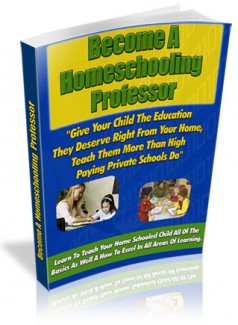 License Type: Private Label Rights
License Type: Private Label Rights  File Size: 377 KB
File Size: 377 KB File Type: ZIP
File Type: ZIP
 SKU: 11524
SKU: 11524  Shipping: Online Download
Shipping: Online Download
Ebook Sample Content Preview:
Known among home schoolers as "the S word," socialization concerns many home schoolers and their extended families. Most people think that children who are home schooled aren’t given the social opportunities that their peers are thus making them almost “freaks”. Nothing could be further from the truth.
This is where home schooling support groups come into play. These groups contain families who are just like you – and children who are like yours.
Many home schooling groups get together for group outings, picnics, parties, etc. These are all socializing activities. They give parents the opportunity to talk with other home schoolers and they give the kids a chance to be around others who are just like them.
You are not going to lock your child in the house and keep them from civilization as we know it. At least we hope you don’t!
The socializing aspects of public school are more likely to be harmful to your child rather than helpful. For the most part, people tend to behave worse in large groups such as is found at school. There they learn something completely different: popularity, conformity, bullying, teasing.
The reality is that home schoolers can make friend in after-school activities, during vacations, at church, and just in the neighborhood. Children learn to get along with others through relationships with people of all ages.
Many home schoolers develop these relationships through volunteering, participating in support groups or co-ops, or exploring shared interests with others.
Opponents of home schooling are concerned that these children are also missing out on important school activities – especially in the secondary years. These activities include organized sports, homecoming, prom, and organizations like speech team, debate, student council, etc.
While some schools do allow home schooled children to participate in their activities, still others do not. There is no legal requirement for public schools to offer classes "al a carte," nor is there an incentive for them to do so, since home schooled students cannot be counted for funding purposes.
However, some schools will allow home schooled students to participate in selected academic or extracurricular classes; whether your child will be embraced or rejected will be based solely on the whims of school administrators.
Even if school administrators in your area are receptive to home school part-timers, your child may still not be eligible to play or perform in competitions. Most public schools, and some private schools, voluntarily join a private rule-making organization which prohibits home schooler participation in state sanctioned events and competitions.
These rules generally apply to seventh through twelfth grade students in member schools. When schools opt (and pay) to join the organization, they accept the rules and governance of such organization, and in so doing, gain the right to compete against other member schools, and to compete (subject to rules) in district, region and state contests, play-offs and championships for sports, vocal music, band, orchestra, speech, drama and cheerleading.
Under organization rules, home schoolers are prohibited from competitive events because they do not attend member schools 90 percent of the time. Generally, home schools are ineligible to become member schools under the constitution of the organizations thus exempting home schooled students to partake of these events.








